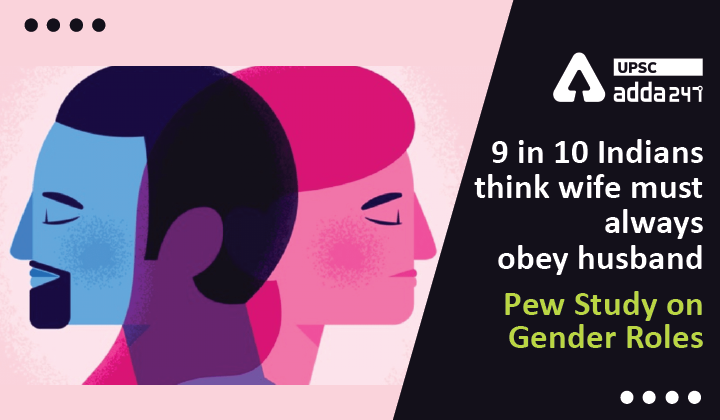Table of Contents
Pew Study on Gender Roles- Relevance for UPSC Exam
- GS Paper 2: Salient features of Indian Society- Women in Indian Society.
Pew Study on Gender Roles- Background
- A Pew study on Gender Roles titled “How Indians view gender roles in families and society” was released recently, highlighting the status of women in contemporary Indian Society.
- The findings of the Pew study are based on a survey of 29,999 Indian adults conducted from November 2019 to March 2020.
- The study found that for a variety of historical, social, religious and economic reasons, families tend to place a higher value on sons rather than daughters.
Pew Study on Gender Roles- Key Findings
- Favour Traditional Gender Roles for Women: The study found that while Indians accept women as political leaders, they mostly favour traditional gender roles in family life.
- While 55% of Indians believed that men and women make equally good political leaders, “nine-in-ten Indians agree with the notion that a wife must always obey her husband”.
- Indian women were only slightly less likely than Indian men to agree with this sentiment (61% versus 67%).
- On Child Care: Although most Indians expressed egalitarian views on gender roles, with 62% saying that both men and women should be responsible for child care.
- However, traditional norms still held sway, with 34% convinced that child care “should be handled primarily by women”.
- On earning roles: 54% of respondents say that both men and women” should be responsible for earning money.
- On the other hand, as many as 43% believed that earning an income is mainly the obligation of men.
- 80% of Indians agreed with the idea that when there are few jobs, men should have more rights to a job than women.
- Male Son Preference: While Indians valued both sons and daughters, nearly 94% said it is very important for a family to have at least one son, with the corresponding figure for daughters being 90%.
- On the Inheritance Rights: About 64% of Indians also said that sons and daughters should have equal rights to inheritance from parents.
- On Parental Care: while four-in-10 adults said that sons should have the primary responsibility to care for aging parents, only 2% said the same about daughters.
- On Sex-Selective abortion: 40% of Indians saw “sex-selective abortion as acceptable in at least some circumstances”.
- However, 42% found this practice “completely unacceptable”.
Juvenile Justice (Care and Protection of Children) Act, 2015
Pew Study on Gender Roles- How India fares on Global Scale
- On Gender Equality: A global median of 70% said that it was very important for women to have the same rights as men.
- Similarly in India, 72% of Indians believe that gender equality is very important.
- Indians were less likely than people in North America (92% median), Western Europe (90%), and Latin America (82%) to place a high value on gender equality.
- They were more likely to do so compared to sub-Saharan Africa (48% median) and the Middle-East-Northern Africa region (44%).
- In South Asia, Indians were more likely to bat for gender equality than Pakistanis (72% to 64%).
- Indians with a college degree were less likely to hold traditional views on gender roles, although this did not extend to all gender-related issues.




 TSPSC Group 1 Question Paper 2024, Downl...
TSPSC Group 1 Question Paper 2024, Downl...
 TSPSC Group 1 Answer key 2024 Out, Downl...
TSPSC Group 1 Answer key 2024 Out, Downl...
 UPSC Prelims 2024 Question Paper, Downlo...
UPSC Prelims 2024 Question Paper, Downlo...





